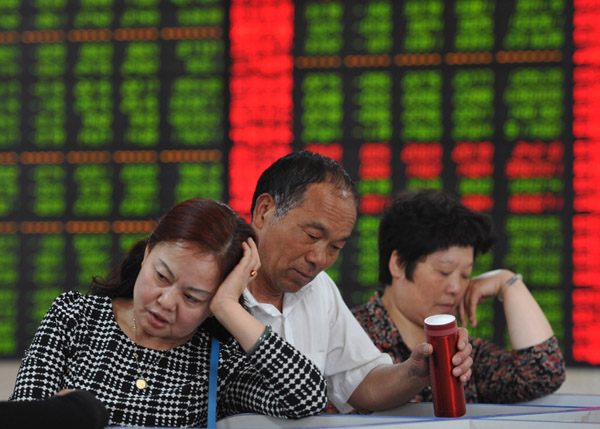 |
|
Investors look downcast at a stock trading center in Fuyang, Anhui province, as Chinese shares slump 4.06 percent on Tuesday, the biggest daily drop in three months. [Photo/China Daily] |
The economic fundamentals remained weak in April despite the stock market bubbles, and have shown little sign of a rebound even though the central bank has lowered the reserve requirement ratio twice and cut benchmark interest rates once since November.
The official manufacturing Purchasing Managers Index, a leading economic indicator that shows the overall industrial production situation, was on the verge of contraction last month at 50.1. However, a separate PMI figure from HSBC fell to a one-year low of 48.9 in April.
"Underlying economic activity appears to have slowed further from March, warranting more aggressive easing measures in the coming weeks in order for the economy to stabilize toward midyear," said a research note from the bank.
Song Yu, a Chinese economist at Goldman Sachs, expects the loosening of policy to continue. This will be achieved through a combination of administrative tools, such as putting pressure on local governments to increase fiscal spending and pushing ahead with infrastructure projects, and market-based tools such as cuts to the reserve requirement ratio as well as lower benchmark and interbank interest rates, Song said.
Investors buy into soccer reform plans
Investors are buying shares associated with soccer as the country's leadership unveils plans to revitalize the game and reform the way it is run.
However, analysts say few of the target companies are in fact closely linked to soccer, and some of the shares have been overbought.
The news that Vice-Premier Liu Yandong will lead a panel responsible for the soccer reforms sparked the latest buying frenzy last week.
Nine listed companies with ties to the national soccer league have surged by an average of 158 percent since March 2014, when President Xi Jinping first signaled plans to revive a game that has been troubled by bribery and match-fixing scandals, according to Bloomberg.
The so-called soccer concept shares, which include stocks of club operators, football manufacturers and game sponsors, have seen corrections this week, with the benchmark index surrendering some of its gains and falling by the largest amount in three months on Tuesday. However, many investors still have faith in the sector.
